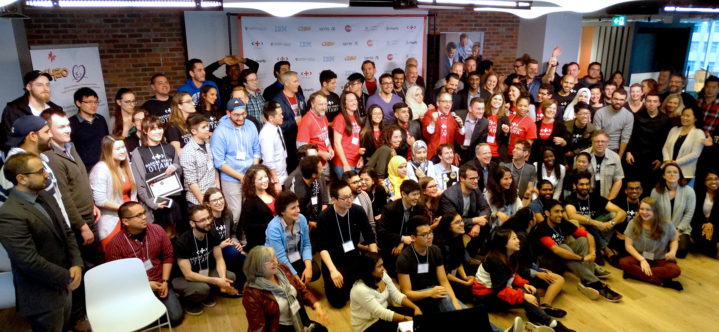Written by Hacking Health Ottawa Volunteer Kevin Dick who joined a team and jumped into the trenches to give us a recap of his weekend. Originally published on HHOttawa’s blog on Medium.
The long anticipated Hacking Health Hackathon, hosted by Shopify, came and went in a blur. In the short two and a half days, ideas were pitched, expertise was shared, and prototypes developed with the common goal of improving the healthcare system.
In broad strokes, Friday brought together physicians, developers, politicians, and members of the health community from as far away as California to set the scene, with none other than Cofounder of the Hacking Health movement, Luc Sirois hyping up the participants in anticipation of (and throughout) the weekend. Saturday was an event-filled day with participants arriving at 8 a.m. and hacking well into the night. Sunday was a frenzy to bring projects to a close and judging of the final pitched ideas, each team vying for the prizes that could bring their prototype to the next level! From end-to-end, it was a resounding success full of camaraderie and competition, energy and euphoria, and of course: hacking and health!
Friday: The Official Kickoff!
With the close of business hours, most of Ottawa was eagerly anticipating the promised sunshine of the weekend. A different energy was stirring at 150 Elgin, home of Shopify and temporary home and workspace of over 150 hacking health participants through the highly anticipated Hacking Health Hackathon! A steady stream of physicians, developers, engineers, designers, politicians, media, and health enthusiast converged into the large bright space. As they mixed in together, some were reminiscing on the string of events leading up to this moment, others actively networking with one another and eager to learn what was in store for the next few days.
The event began with a number of prominent speakers addressing the assembly of participants. Most notably, Haidee Thanda, the Chapter Leader of Hacking Health Ottawa welcomed us and described the journey that had led to this point. The highly enthusiastic Global Hacking Health Cofounder, Luc Sirois, took the stage and operated as both Master of Ceremonies and hype man, drawing out the enthusiasm of the crowd. He explained how these types of events would come to define our moment in history and be part of the stories passed onto the next generations. Describing how in Canada, we are an example for healthcare around the world, Mr. Sirois emphasized that this success is the result of constant innovation and urged us all to continually push that cutting-edge fringe of healthcare technology forward. He explained that this is why Hackathons are so crucial:
“We cannot invent without learning!”
In bringing together experts from multiple disciplines, teams can share in unique perspectives and increased breadth and depth of knowledge. Mr. Sirois described how innovation in healthcare is necessary for the transformation of the institution; ensuring that is a dynamically growing entity.
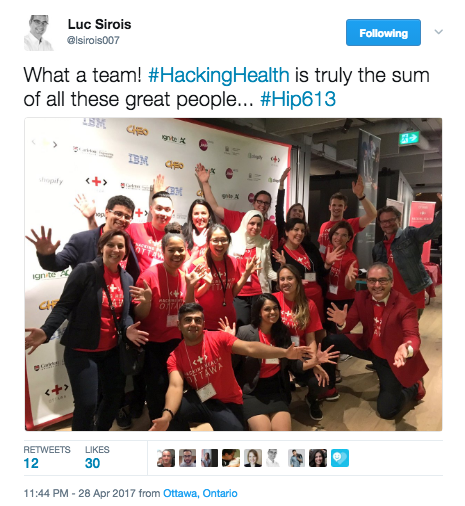
This idea was then built upon by the next speaker, Alex Munter, the CEO and President of the Children’s Hospital of Eastern Ontario and Ottawa Children’s Treatment Centre (CHEO-OCTC). He first described the history of CHEO-OCTC, explaining that there was significant resistance to establishing the institution with many claiming that Canadian healthcare was not sustainable.
“That would be true if your definition of ‘Sustainable” is ‘doing the same thing every year’!”
Mr. Munter explains that through the years, numerous allegations have been politically argued about the sustainability of the healthcare system and that the continual research and innovation has evolved the institution such that processes become more efficient. Ultimately, he states:
“Innovation is what drives the sustainability!”
Without innovation, the healthcare system would be in trouble and he therefore urged us all to pursue our passion to contribute to the health system. Concluding, he described his high expectations for the generation of millennials that will drive research and wished everyone good luck and that they enjoy themselves through the weekend.
Steven MacKinnon, the Member of Parliament for Gatineau then took the stage, offering the Federal perspective of innovation in healthcare. Explaining that healthcare consumes 40–50% of provincial budgets (outpacing inflation!) it is necessary that technology help produce increasingly efficient systems. He notes that the federal government recognizes this trend and that many efforts have been put forward to break down the barriers to information by opening access of data to the public.
Finally, Randy McCaig, Director of the Ottawa Desjardins Office and member of the Business Development team, congratulated us all for “being a little bit crazy!” Having experience in bringing successful hackathon projects to market, he commended all participants on their willingness to promote change in healthcare.
With that, the pitches started!
With about 25 different projects outlined on the Hacking Heath Sparkboard, each project lead had 60 seconds to pitch their idea with the intention of recruiting participants with the right skill-set. In a quick-fire manner, each idea was rapidly pitched in succession of the next. About halfway though, to keep energy high, we were all guided into a stretching routine and mandatory “Go Sens Go” chant while performing the wave.
With the final idea pitched, then came ‘The Match’, where participants ebbed and flowed throughout the room to pick the idea that they wished to commit to during the weekend. With clusters formed, each team found a secluded space to share in introductions and settle into deeper discussions of the problem faced and the approaches to resolve it.
Having been a part of the Sleep Apnea project leading up to the hackathon, I was one of twelve members committed to the project. Interestingly, team sizes varied from the very small (2–3 members) to the very large (8–12 members) with most fitting somewhere in the middle. Our team also appeared to comprise a disproportionately high number of machine learning aficionados. Certainly the skill-set within a team would help provide some context to the proposed solution; a particular challenge we faced was breaking out of our comfort zone and considering the problem from unique perspectives.
After several hours of discussion, we began converging on a weekend strategy and anticipated reuniting in the morning to begin bringing the pieces together! The teams slowly dissipated with an eagerness to tackle the problem in the morning!
Saturday: Hacking Commences!
Arriving as early as 8 a.m. and staying on well into the night (~11 p.m. kick out), Saturday was buzzing with energy. From dawn until dusk, it was somewhat magical to see ideas emerging as tangible prototypes in so short a time. With teams interspersed among one another, there was a congenial, yet competitive atmosphere. A broad range of mentors and experts were available for consulting on various aspects. From data visualization, to 3D printing services, to business model development, to sensor integration; there was help for any facets to each unique project!
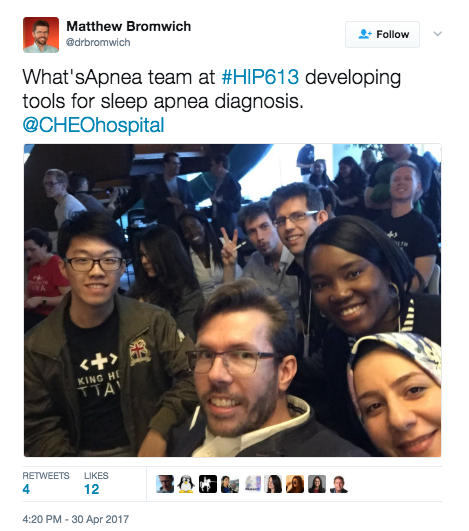
Our team convened bright and early, and we rapidly brainstormed and refined a number of aspects of our proposed solution. The central problem we were addressing was the lack of information to support the diagnosis of a child’s sleep apnea, and current waitlists for a sleep study (which are often ineffective) can be upwards of two years. Our project leader, Dr. Matthew Bromwich, was eager to address any and all questions. Having a large team, we opted for a three-part solution:
· Engage: Parents suspecting that their child might have sleep apnea often come unprepared to consultancies with specialists. There are no resources for a concerned parent to consult which outline the various steps of information gathering about their child’s sleeping behaviours. In order to promote parent engagement, we decided to create a website (www.whatsapnea.com) which would outline the information a parent should bring to a consultation to facilitate the diagnosis of their child.
· Capture: Video footage of Sleep Apnea events make compelling evidence for diagnosis. We decided to create a sleep apnea video capture app to standardize the data collection process to amass evidence about a child’s sleeping behaviours. With a long-term goal of generating a night-long analysis system, the WhatsApnea app would allow parents to regularly collect video footage to help a physician with their diagnosis.
· Analyze: Using facial skin tone, we can extract heart rate from a patient in a contactless way. As part of the data analysis team, I sought to extract physiological information from patient videos to determine if we could detect sleep apnea events without the use of complex medical equipment. This machine learning layer would add significant value to the process of sleep apnea diagnosis as sleep apnea events could be automatically detected and provide a preliminary assessment to physicians.
As a biomedical engineering Master’s candidate with a passion for problem-solving, I reveled in the opportunity to engage with a physician on the front-lines of these medical system challenges. This is an opportunity rarely seen outside of a hackathon framework.
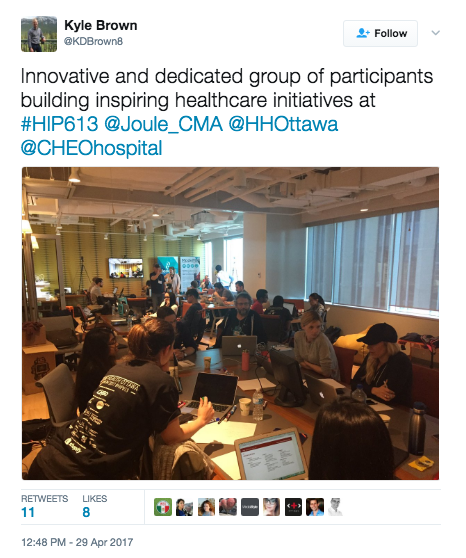
The Engage sub-team extensively used the IBM Design Mentors (Yasmine Taha and Peter Djeneralovic) to develop Empathy Maps and build a story around a proposed patient. This helped narrow down the scope of the problem to tangible targets. In general, whenever someone faced a particular roadblock, other team members were eager to find a way to circumvent it or mentors were available to provide expertise.
Ottawa’s own prototypeD experts were in-house offering a range of consultancy services including 3D printing and data visualization. My own work with the Analyze team necessitated the visualization of data streams in an interactive and dynamic manner. Janak Alford, Founder and CEO of prototypeD, helped me identify a number of packages to achieve what I envisioned.
This fully supportive and highly engaging atmosphere truly fostered individual and team creativity in the pursuit of healthcare solutions! To promote a healthy work environment, yoga sessions were also offered to help relieve tension and to reinvigorate the body after long periods in front of a computer.
Teams worked on late into the evening until the 10:30 p.m. kick out. Undoubtedly a number of teams would have carried on further into the early hours of the morning if they had the opportunity. For some that momentum transferred spatially from Shopify to their homes while others, temporally, from night to Sunday morning…
Sunday: Judgment Day!
The last day of the hackathon could be characterized by an altogether new flavor of anticipation: one that is sprinkled with anxiety and frenzy. The 3PM deadline was on everyone’s mind. Our team rapidly realized the importance of putting together a compelling presentation and we rapidly shifted gears from prototype development to pitch-craft!
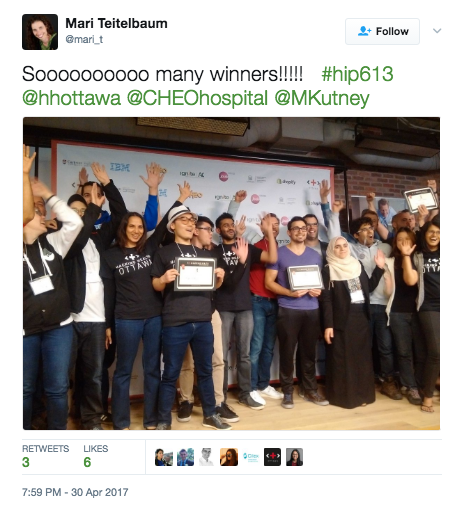
With a developer-heavy composition, our team lacked expertise in business model development. A panel of business-oriented mentors was available to help identify the value proposition to our three-part solution. Having scheduled one of the last appointments with them, this panel was a prized commodity in the frenzy of Pitch day.
How do you boil down the breadth of a problem and solution into a relatable, compelling, and investable presentation of a mere 180 seconds? We iterated our presentation over and over again until we converged on what we deemed the right flow. As one of the speakers, I was afforded a 20–30 second slot to convey the intricacies of our data analysis solution in a couple of sentences. One rapidly realizes that technical jargon must immediately be replaced with high-level concepts.
As the hours whittled away, you increasingly observed the shift toward pitch practice in the hallways and discrete workspace corners. Finally, the moment of truth arrived and all teams convened to the stage where a short ~40 hours ago the event had officially kicked off!
Each team took the stage and presented their problem and solution. Some creatively used a short skit to outline their issue; others relied on compelling visuals and videos. Common to all was the passion with which the project was delivered. A number of questions from the diverse panel of judges followed each presentation enabling the team to elaborate on their solution. It was clear that an incredible amount of effort had been put in by each of the teams and some had very promising approaches.
When the time came for deliberation by the judges, it was clear that the competition was incredibly close and teams eagerly anticipated the outcomes!
Here is the list of winners:
Prizes
CHEO Pilot Opportunity Prize
Sparkboard #59: Patient Wait Time
Sparkboard #2: Sleep Apnea Diagnostic Tool
IBM Watson Grand Prize
Sparkboard #46: Crowdsourcing Knowledge Synthesis in Medicine
Sparkboard #95: Canadian Pediatrics Hematology/Oncology Patient Database
IBM IoT Gold Prize
Sparkboard #47: A Smarter Post-operative Knee Brace
IBM IoT Silver Prize
Sparkboard #2: Sleep Apnea Diagnostic Tool
Joule Innovation Mentorship Prize
Sparkboard #75: Free Flap Monitoring
Shopify Mentorship Package
Sparkboard #91: Alrt Me
Sparkboard #47: A Smarter Post-operative Knee Brace
Sparkboard #73: VitalTracer
Impact Hub Ottawa Prize
Sparkboard #93: Timsle
Sparkboard #46: Crowdsourcing knowledge synthesis in medicine
Sparkboard #95: Canadian pediatrics hematology/oncology patient database
Designer Dream Team Prize, $5000
Sparkboard #47: A Smarter Post-operative Knee Brace
Sparkboard #80: Triage (MADD booking for Med)
Sparkboard #76: Better and Safer Critical Congenital Heart Disease (CCHD) Screening
Showcase Showdown Prize, $1000
Sparkboard #72: Take Care
Sparkboard #49: Latched
Awards
Desjardins Health Innovation Award
Sparkboard #84: WHIT: Women’s Health Information Tracker
Can Hack It! Sponsored by Macadamian – $250
Sparkboard #49: Latched
Sparkboard #84: WHIT: Women’s Health Information Tracker
Hacking Health Choice Award
Sparkboard #84: WHIT : Women’s Health Information Tracker
Best Solution for Healthcare Collaboration Award
Sparkboard #49: Latched
Best Solution for Patients Award
Sparkboard #91: AlrtMe
Best Health Education Solution Award
Sparkboard #85: Online Medical Publishing Platform
People’s Choice Award
Sparkboard #47: A Smarter Post-operative Knee Brace
With all said and done, Hacking Health Ottawa would again extend their thanks to all sponsors and who made this hackathon such a resounding success. Of course, this event is just another on the journey to implementing effective change in healthcare locally and globally.
Hacking Health Ottawa has a number of post-hackathon events in the weeks to come. Stay tuned for more info! Don’t want to miss a thing? Be sure to register for our newsletter or follow us on Twitter!
For more stories and articles about the success of the weekend, please see the following links:
[/banner]

